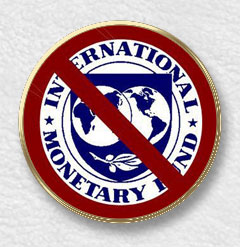
The International Monetary Fund interferes too much in the domestic politics of the countries it seeks to assist. What’s more, the IMF’s policies don’t generate prosperity or alleviate poverty. That’s what a bipartisan congressional commission concluded recently. Unfortunately, the panel’s prescription was misguided: Reinvent the IMF, yet again.
The only cure for the IMF’s ills is to pull the plug on that international bureaucracy. Why? Look no further than the disaster it wrought in Southeast Asia. With the collapse of the Thai baht in mid-1997, the entire region entered an economic maelstrom. The IMF’s remedy: floating exchange rates.
We were told that this elixir would bring prosperity. Indeed, when Indonesia floated the rupiah in August 1997 the IMF’s deputy managing director, Stanley Fischer, confidently proclaimed that this move, “in combination with Indonesia’s strong fundamentals, supported by prudent fiscal and monetary policies, will allow its economy to continue its impressive economic performance of the last several years.” (Fischer has since been elevated to the post of acting managing director.)
Balderdash. With the exception of Hong Kong, all the countries in Southeast Asia allowed their currencies to float. And float they did. Downward. From the end of 1996 through December 1999 the Indonesian rupiah did the worst relative to the greenback. And the other floaters suffered large devaluations, too.
Consequently, their economies took heavy hits. There’s no denying that the worse the devaluation, the worse the economic devastation True to form, the IMF is spinning a different yarn. Its chief spokesman, Thomas Dawson, wrote an indignant defense of its Asian policies in the Wall Street Journal in mid-March. To obfuscate how the institution’s wrongheaded policies decimated Asian living standards, he noted that South Korea’s growth was 10% in 1999 and Thailand’s 4%. But those were only partial recoveries from the sickening falls these economies had suffered.
I can testify firsthand how destructive—and politically driven—the IMF can be. In February 1998 then-President Suharto, the Indonesian leader, appointed me as his adviser. To stop the rupiah’s fall, I recommended that Indonesia adopt a currency board like Hong Kong’s. The markets loved it. On the day this proposal hit the press the rupiah strengthened by 28% against the dollar.
Mind you, Suharto was not a popular man with the IMF or the Clinton Administration. Since a currency board would have stabilized the rupiah, that would have enhanced his position. So the IMF and the Administration mounted a massive counterattack, pressuring the Indonesian government to back off the board idea.
Recently, however, I was inadvertently vindicated by none other than Michel Camdessus, the departing IMF managing director. On his retirement Camdessus boasted that “We created the conditions that obliged President Suharto to leave his job.” In other words, they caused considerable human suffering in the course of trying to accomplish a political goal.
Upon hearing this, former secretary of state George Shultz told National Public Radio: “I don’t think that’s a function of the IMF. Look what’s happened in Indonesia—income per capita cut in half, poverty widespread, religious intolerance on the rise.”
I couldn’t have said it better.
Author Steve H. Hanke

0 responses on "Abolish the IMF"